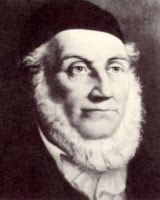![]()
August Wilhelm von Schlegel
Along with Coleridge, Schlegel is credited with having first introduced the notion of a Hamlet who is paralized by an excess of reflection.
|
The whole is intended to show that a calculating consideration, which
exhausts all the relations and possible consequences of a deed, must
cripple the power of acting; as Hamlet himself expresses it: -- |
 |